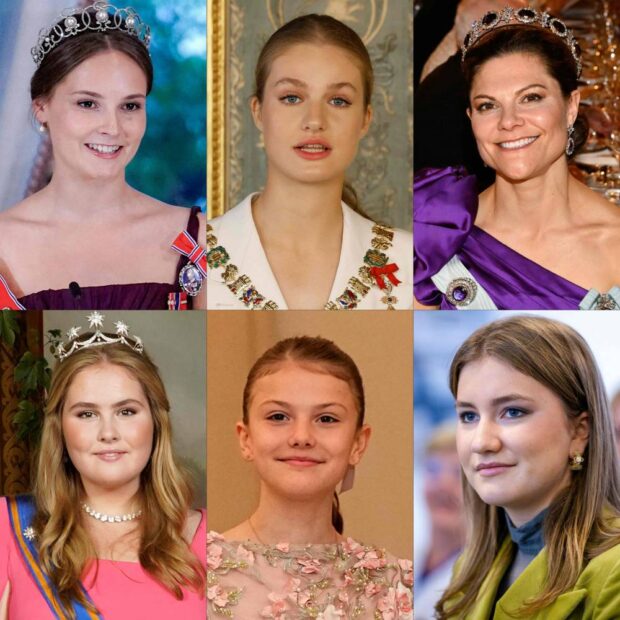As Gen Z rises, more queens in store for European royalty

MODERN ROYALS | This combination of file pictures shows (from top left to bottom right) Norway’s Princess Ingrid Alexandra, Spanish Crown Princess of Asturias Leonor, Sweden’s Crown Princess Victoria, Netherlands’ Princess of Orange Catharina-Amalia, Sweden’s Princess Estelle and Belgium Crown Princess Elisabeth. (Agence France-Presse)
PARIS — The abdication of Denmark’s Queen Margrethe leaves Europe without a female monarch, but not for long — a young generation of princesses born in the 21st century will be ascending to thrones across the continent in the coming years.
Belgium’s Princess Elisabeth, born in 2001; Catharina-Amalia of the Netherlands (2003); Ingrid Alexandra of Norway (2004); Leonor of Spain (2005); and Estelle of Sweden (2012)—half of the hereditary monarchies on the Continent are likely to be led by a queen before long.
Many will be the first to take the throne after introducing female succession laws, a privilege previously reserved for male heirs.
Previous queens, such as Elizabeth II of Britain, who died in 2022, had no brothers to inherit the throne.
“Sweden was the first country in the world to adopt a gender-neutral order of succession, in 1980, when Princess Victoria bumped her younger brother down, and she became crown princess,” retroactively, Swedish royals expert Roger Lundgren told Agence France-Presse (AFP).
Article continues after this advertisementMilitary service
Several experts said gender was unlikely to have much of an impact as the future queens embrace their new roles.
Article continues after this advertisement“Much of what kings and queens do today, and what they will do in 25 years, is what kings did 200 years ago too—state visits, receiving ambassadors, ceremonial things,” Lundgren said.
But he also noted that, unlike earlier generations of queens, many in the upcoming generation had done some form of military service in their country.
In December, for example, Spain’s Hola! magazine showed Princess Leonor in combat camouflage, taking part in ski drills with her unit on slopes in the Pyrenees.
Other princesses have studied in elite schools at home or abroad. Both Leonor and Princess Elisabeth of Belgium studied at Atlantic College in Wales—exposing them more to global affairs and concerns such as feminist causes or the risks from climate change.
“A clearer, firmer footing in the everyday life of the people, in combination with the pomp, castles, jewels and the fairy tale, is the winning concept to keep the monarchy,” said Ebba Kleberg von Sydow, a Swedish influencer and royals expert.
WhatsApp group
Von Sydow said future queens were likely to prove more media-savvy as well if only to show that monarchies remain grounded and relevant in modern society.
Lundgren noted that while Queen Margrethe “doesn’t even own a smartphone, and is proud of it,” Crown Princess Victoria of Sweden, Denmark’s Crown Prince Frederik and Norway’s Crown Prince Haakon have their own WhatsApp group.
“You need to be on more platforms, have your message reach people in a completely different way, now that traditional media channels that previous generations of royals used no longer reach everyone,” von Sydow said.
In many ways, Europe’s future queens will be wrestling with new iterations of the question that has often confronted their ancestors.
“Each new generation of monarchs has had to face one main challenge, and not the least: the questioning of what is the use of a monarchy,” said Lisa Castro, a royals historian at the University of Toulouse-Jean Jaurès in southern France.
In this regard, she said, being tuned in on issues like women’s and LGBTQ causes or environmental concerns will be a tool for ensuring the public’s backing.
But the next generation appears “the best placed to respond to expectations on these subjects—they understand the needs and the challenges of their time,” Castro said, pointing to the embrace of climate causes by Scandinavian royal families.
“It’s inevitable that modern times will have an influence on the institution of the monarchy,” said Spanish journalist Pilar Eyre, noting in particular the polished image management by Britain’s Prince William and his wife Kate.
His brother Prince Harry, meanwhile, has moved to California with his American-born wife, Meghan, previously an actress—the latest of several examples of modern royals tying the knot with commoners.
Contemporary causes
There is already a precedent for embracing more contemporary causes—Spain’s Queen Letizia, who was a journalist when she met her future husband, King Felipe, recently visited an aid association for women prostitutes—“which would have been unheard-of for preceding generations,” Eyre said.
In 2021, Mark Rutte, the Dutch prime minister at the time, said that if she wanted, Princess Catharina-Amalia could marry a woman under the country’s same-sex marriage laws and still ascend to the throne.
“It’s with these types of gestures that you earn the affection and respect of citizens—not with grand ceremonies and magnificent outfits,” Eyre said.